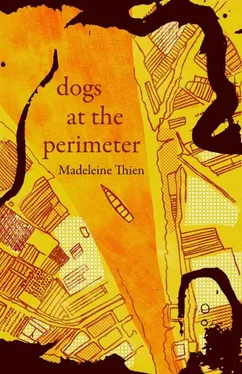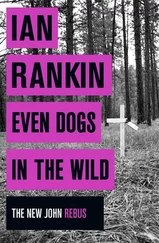She was taken from the prison that night and killed. Sopham locked himself in a storage room and used a candle to study the map. He could still hear the woman’s breathing, the shallow exhalations. When he was small and learning to tie his first knot, our mother had told him that a rope almost never breaks within the knot itself. Instead a rope is weakest just outside the entrance to a knot, where the load is greatest. The map showed a way to the heavily guarded Vietnamese border, into the caves and out again. The second scrap of paper held a single phrase, written so lightly he almost didn’t see it.
The river has flooded this year.
A smuggling ring, he thought. A code.
He returned to the map. If disciplined, perhaps he could travel there in a single day. My brother knew that Angkar would seek his family out, uncles and aunts, cousins, friends. They would be identified and arrested. He no longer believed that our mother was alive. Who was left? Only his sister. Only me.
When he could see the map in his mind’s eye, my brother burned the papers. He placed the ashes on his tongue where they turned to paste and little by little dissolved.
He waited for the hot season to end. In the forest beyond the prison he hid lighters, clothing, uncooked rice, paper, pencils, candles, a good knife. Rithy existed and survived. He waited and kept his hands and his face impeccably clean but inside, there was someone else, a boy who watched, who had no need for language, who saw everything but never spoke, a boy who waited in the dirt for the end of one season and the start of another.
When news arrived at the prison that a girl at the reservoir was searching for Prasith, my brother, ever reliable, asked permission to bring her to the security office. He had done this before for other enemies. Chea, suspicious of everyone but my brother, agreed. Sopham hid his supplies on his body. He set off on an old bicycle, carrying the travel pass that Chea had given him.

Every day, hauling mud in the bottom of a vast, dry reservoir, I followed Bopha’s tracks. Our work unit, made up of three dozen girls, moved from project to project. Sometimes we hauled mud or shit, or we dug with our bare hands, or we gathered wood. Sometimes we just marched from one destination to another, guided by a brutal but confused cadre. Bopha, Chan, Thida, Srei, Vanna, so many more, these are the children I remember. Oun, the dentist’s son, arrived here, too, part of a children’s mobile unit.
At night, I slept beside Bopha. We were the same age, we had the same blunt haircut, the same hollow bellies, but her eyes were bright and questioning and alive. Somehow, months of working in our brigade had not dulled them. When she laughed, she covered her eyes with her hands. All I would see was her upturned mouth, pale lips, a flash of teeth, stained fingers.
Every few weeks, Bopha would leave the reservoir at night. She would walk into the fields, through the blackness, until she reached the cooperative where her older sister lived. These nights were always the worst for me. My terror grew and grew, choking my breath. I wanted every noise, every approach, to be hers. Somehow, Bopha always succeeded in avoiding the patrols. When she returned before dawn, I held her more tightly, I watched her constantly, I did not want to let her disappear.
I recognized my mother everywhere, in the groups of women whose arms and legs were thin as blades, who dug endlessly at the ground. I tried to climb away into my mind, there were tunnels there, lakes, shelters within shelters. Memories came to me like objects sliding off a shelf. Week after week, I tried to convince myself to go back, just as Bopha did, but I kept putting it off. The darkness held a terror for me. Many times, I dreamed that I went home but my mother was already gone. No trace of her, no record, remained. Everything I knew had gone away. All around me, hour after hour, I heard the steady crack of shovels against earth.
At the height of the dry season, Oun beckoned to me across the reservoir. Briefly, a line connected us, taut for a moment, before he dropped his eyes. Slowly, cautiously, we drew nearer to each other, until we were side by side. Oun set his basket down, pretending to be occupied with it. “I went back,” he said. “I saw my mother.” I tried to shield my eyes from the glare of the sun. He hesitated, picking some rocks out of the basket. “Sopham was gone, sent away like us.” One by one, the rocks came out. “I heard your mother was ill and that Angkar sent her to the infirmary.” “Oun,” I said. I saw the basket lifting, and then his bare feet, dark against the soil. The sun was nearly in the centre of the sky. It had taken him this long to reach me. “Do you know the place?” he asked me. His words came quickly now, rushing out. “It’s where my father died. You must know it. In this sub-district, there’s only the one infirmary.”
I glimpsed a cadre walking toward us.
“I know it,” I whispered.
Desperately, I pushed my hands into the warm mud, digging, busying myself. Time slowed. The morning light had solidified around us, holding each object, making every outline, all the shapes and all the people, precise unto themselves. I looked up. The cadre was watching us from a distance.
“Go,” Oun said, moving away. “Don’t wait.”
I remember very little of the journey. Bopha gave me her sandals, which were newer than mine and in better condition, and then we went, moving through the impossible blackness, quickly, carefully. We had learned to be wary of injury. Wounds didn’t heal anymore. In the heat and humidity, the smallest wounds could become infected. In the reservoir, people died from negligible things, a cut, a piece of rotten food, a single mistake made in a moment of exhaustion. As we ran, I saw Oun and the other children, I saw the cadre, Vuthy, who took care of us and who tried to be kind, but of Sopham or of my mother, my thoughts were bare. Not even their faces came to me. It was as if I could not lift them out from the darkness. We walked on and on, the night stretching around us.
At the edge of a road, Bopha took my hand. She was continuing on to see her sister, and we had agreed to meet back at the reservoir by morning. “Don’t stay away too long,” Bopha said before letting go. Within seconds, the shape of her had vanished into the emptiness.
People slept on straw mats or on the filthy tiled floor, with nothing to cover them or to keep the rats away. A girl wearing a long apron gave me a candle so that I could search for my mother. Slowly, I moved between the bodies, circling once, and then again, and again. I glimpsed a woman’s loose clothing, her dark hair, and finally her face, childlike now, young again. My mother was so very thin, I had not recognized her.
There was no food in the infirmary. People lay covered in flies, too weak to climb out to use the latrine, unable to scavenge and feed themselves. They groaned and cried for water. My mother’s hands were so tiny, they could fit inside my own. I stroked her hair and whispered her name. I said that her girl had come back, I had come to take her home. The wind blew inside and cooled us. A memory came to me of the sugar water she had drunk, perhaps a year ago now. It seemed like it must be a different girl, a different mother. She opened her eyes and looked at me as if from a great distance.
“Are we going home now?” she asked finally. Yes , I said. The lie felt bitter on my lips. “He’s there,” she said. “Father.”
A boy came and said he was a doctor and he gave me a white paste to rub on my mother’s chest. The paste was chalky and strange, it smelled of the earth and some herb I couldn’t identify. She asked me where my brother was.
Читать дальше













